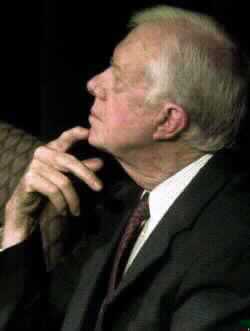- Author:
& News Agencies - Section:
WORLD HEADLINES
- Hajj & Umra WORLD HEADLINES
Carter Wins Nobel Peace Prize-Seen as Indirect Criticism of Bush Administration

Former President Jimmy Carter won the Nobel Peace Prize Friday for a quest for democracy and human rights in an award that also faulted Washington's drive to oust Iraqi President Saddam Hussein . Carter, who was president from 1977 to 1981, won from a record field of 156 candidates vying for the prize named after Alfred Nobel, a Swedish philanthropist and inventor of dynamite.
"I'm very grateful to the committee for choosing me," Carter told CNN after the announcement. "They said the work of the Carter Center is a wonderful contribution to the world. I don't think there's any doubt the Nobel Prize encourages people to think about human rights."
The five-member committee praised decades of "untiring effort to find peaceful solutions to international conflicts, to advance democracy and human rights, and to promote economic and social development."
Since he left office, beaten by Republican Ronald Reagan in 1980, Carter has won praise for tireless work in trying to bring peace from the Middle East to North Korea . He has been repeatedly nominated for the prize, worth 1 million dlrs.
"He has shown outstanding commitment to human rights, and has served as an observer at countless elections all over the world," the committee said its citation.
"He has worked hard on many fronts to fight tropical diseases and to bring about growth and progress in developing countries. Carter has thus been active in several of the problem areas that have figured prominently in the over one hundred years of Peace Prize history," it added.
Carter came close to winning in 1978 when Israeli Prime Minister Menachim Begin and Egyptian President Anwar Sadat shared the Nobel Peace award for a peace deal brokered by Carter.
The committee that year wanted to give Carter the prize but he had not been formally nominated by the February deadline.
Gunnar Berge, head of the committee, said that Carter had been informed. "I think there is reason to say he was surprised and very happy," he told reporters.
The committee also criticized President Bush and his campaign to oust Iraqi President Saddam Hussein. Carter has said it would be a tragic and costly error for the United States to attack Iraq without U.N. support.
Berge, asked if the award criticized Bush, said: "With the position Carter has taken on this it can and must be also be seen as criticism of the line the current U.S. administration has taken on Iraq.
"In a situation currently marked by threats of the use of power, Carter has stood by the principles that conflicts must as far as possible be resolved through mediation and international cooperation based on international law, respect for human rights and economic development," Berge said.
Carter, during the CNN interview, repeatedly declined to comment on lawmakers' approval early Friday of a resolution authorizing a strike on Iraq to compel Iraqi President Saddam Hussein to abandon his weapons program.
"I don't want to pass comment on that," Carter said. He has said in the past that it would be a tragic and costly error for the United States to attack Iraq without U.N. support.
Carter and former Costa Rica President Miguel Angel Rodriguez are leading a 55-member international delegation, representing 16 countries, to observe Jamaica's national elections next week.
Carter is the third U.S. president to receive the Nobel Peace prize, the previous two being Woodrow Wilson and Theodore Roosevelt.
PHOTO CAPTION
Former President Jimmy Carter won the Nobel Peace Prize Friday for working for peace and human rights around the world. Carter won from a record field of 156 candidates vying for the prize named after Alfred Nobel, a Swedish philanthropist and inventor of dynamite. Carter, a Democrat, was president from 1977 to 1981. He is shown at the Carter Center in this Sept. 25, 2002, file photo. (Tami Chappell/Reuters)
Related Articles
 Hajj virtues
Hajj virtues
-
School of Faith in Ten Days of Thul-Hijjah
The believing human self needs strong provocations in order to awaken whenever it is enveloped by laziness in...
-
The Status of Hajj in Islam
Hajj is the fifth pillar of Islam; Allah, The Exalted, ordained it in the ninth year after Hijrah (the Prophet's,...
-
School of Faith in Ten Days of Thul-Hijjah
The believing human self needs strong provocations in order to awaken whenever it is enveloped by laziness in relation...


 Home
Home Discover Islam
Discover Islam Quran Recitations
Quran Recitations Lectures
Lectures
 Fatwa
Fatwa Articles
Articles Fiqh
Fiqh E-Books
E-Books Boys & Girls
Boys & Girls  Hajj Rulings
Hajj Rulings Hajj Fatwas
Hajj Fatwas












